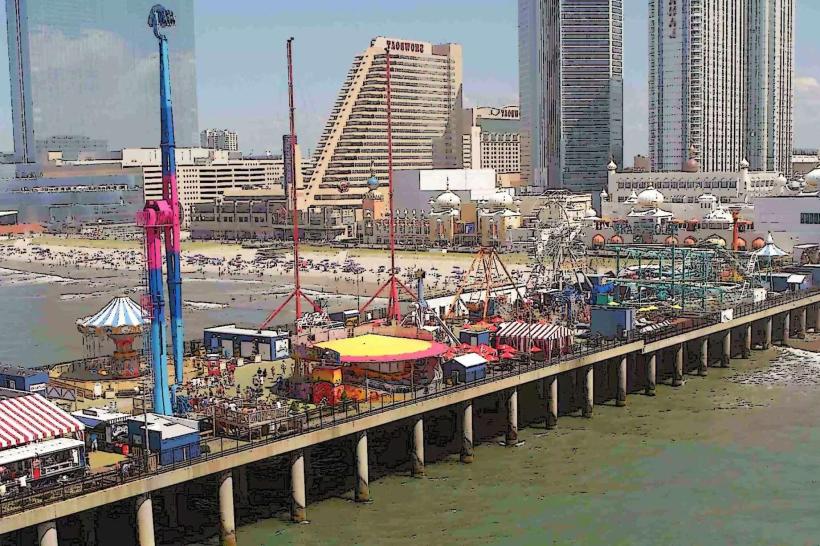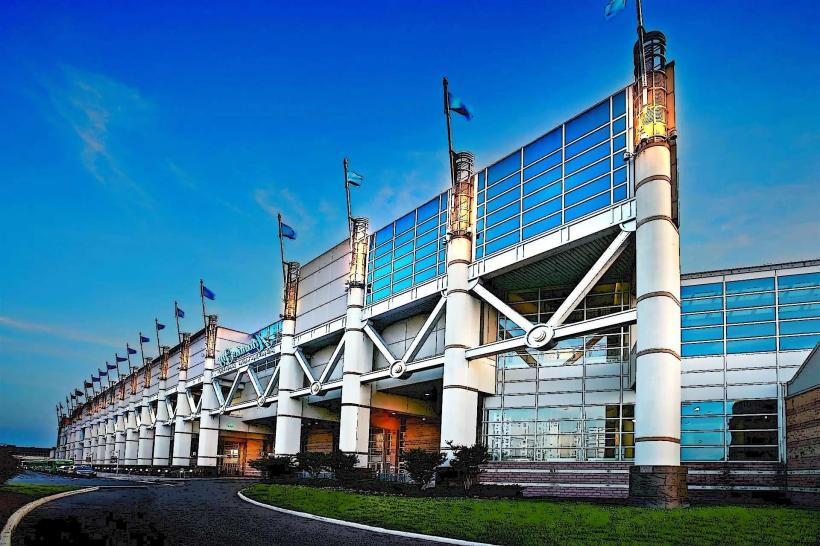Information
Landmark: Boardwalk HallCity: Atlantic City
Country: USA New Jersey
Continent: North America
Boardwalk Hall, Atlantic City, USA New Jersey, North America
Boardwalk Hall, officially known as Jim Whelan Boardwalk Hall, is a historic and architecturally significant multi-purpose arena located in Atlantic City, New Jersey, at 2301 Boardwalk. It opened on May 31, 1929, and was originally named Atlantic City Convention Hall. The hall was constructed on the site of the former Rendezvous Park amusement area and was designed by the engineering firm Lockwood, Greene & Co. Its creation commemorated two important milestones: the 75th anniversary of Atlantic City’s founding and the 50th anniversary of Thomas Edison’s invention of the electric light bulb, reflecting both local pride and technological advancement.
Architectural Significance
Boardwalk Hall stands out as a remarkable example of early 20th-century engineering and architecture. Its main auditorium features a barrel-vaulted ceiling soaring 137 feet high, supported by ten pairs of three-hinged steel trusses. This design creates the world’s largest clear-span space without any internal columns, an engineering marvel at the time of its completion. The absence of internal supports allows unobstructed sightlines throughout the venue and contributes to excellent acoustics, making the hall ideal for large-scale events such as concerts, sporting events, and political conventions.
Historic and Cultural Importance
Boardwalk Hall has played host to a wide variety of significant events, embedding it deeply in American cultural and political history. In 1964, it was the venue for the Democratic National Convention, where President Lyndon B. Johnson was nominated for his full term. That same year, The Beatles performed one of their largest concerts in the United States there, cementing the hall’s reputation as a premier entertainment venue. The arena has also been a major boxing venue, hosting seven of Mike Tyson’s matches, including his famous 91-second knockout of Michael Spinks in 1988. These events demonstrate the hall’s versatility and its role as a focal point for diverse forms of entertainment and public gatherings.
Renovations and Modern Use
By the late 20th century, Boardwalk Hall required modernization to meet contemporary standards for comfort, safety, and technology. In 2001, a comprehensive $90 million renovation was completed. This extensive upgrade transformed the venue into a modern special events arena with a seating capacity of approximately 14,770 for concerts and other large events. The renovation included improvements to the seating, stage, sound systems, lighting, and infrastructure to accommodate a broad range of activities from concerts and sporting events to conventions and exhibitions.
Within the complex is the Adrian Phillips Theater, a 23,100-square-foot space that seats around 3,200 people. This theater provides a more intimate setting for performances, conferences, and other smaller-scale events, adding to the versatility of the venue.
The World’s Largest Pipe Organ
One of the most unique and defining features of Boardwalk Hall is its pipe organs, particularly the Midmer-Losh organ located in the main auditorium. This pipe organ is recognized as the largest in the world, boasting over 33,000 pipes. Construction of the organ took place between 1929 and 1932, making it a monumental feat of early 20th-century craftsmanship and design. The sheer scale and complexity of the organ make it a rare and historic musical instrument. The organ is currently undergoing restoration to preserve its functionality and historical significance. In addition to the Midmer-Losh organ, the adjacent Adrian Phillips Theater houses a 55-rank Kimball organ, originally installed to accompany silent films during the theater’s early years.
Current and Future Use
Today, Boardwalk Hall remains a vibrant venue hosting a variety of events, including concerts, sports tournaments, conventions, and cultural events. It continues to attract both local and international audiences, maintaining its status as one of Atlantic City’s premier entertainment destinations. The hall's calendar includes performances by notable artists and major sporting competitions, reflecting its ongoing relevance and adaptability.
In summary, Boardwalk Hall is a landmark of architectural innovation, cultural history, and musical heritage. It combines its unique structural design with a rich history of landmark events and the distinction of housing the world’s largest pipe organ, making it a treasure of both Atlantic City and American history. Its continued use and preservation efforts ensure that it remains a dynamic and cherished venue well into the future.










